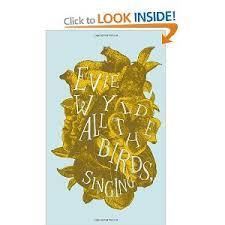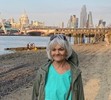Patsy Trench's Blog, page 13
July 14, 2013
All the birds, singing
I don’t normally post reviews of books (theatre is more my genre) but this is such a great read – it’s a page-turning story that moves about in time and place, very deftly written and truly quite hard to put down. And it is has a strong Australian element. This is the review I just posted on Goodreads.
Such a cleverly written book. Jake, the central character, an Australian (and female) has fetched up living on her own on a sheep farm on an island off Scotland. Why is she so determined to be a hermit, and what is it that is killing her sheep? And who is the mysterious stranger she sees hanging about her property?
As we move conventionally forwards in the present we also learn, gradually, and in reverse chronological order, about Jake’s past in Australia and how it is she’s ended up where she is: still scared, still effectively on the run. So we’re all the time wanting to know about the present and about her past – how she fetched up with Otto, how she came to be a sheep shearer and how she got those scars on her back. There’s never any confusion about where or at what point of the story we are. The ending is completely unpredictable, but it is satisfying. A very deftly written piece of work and much recommended.


June 15, 2013
Some interesting statistics on publishing
I learned many interesting things at the Literary Consultancy’s conference Writing in a Digital Age.[1]
Social networking doesn’t sell books.
Sales of eBooks has gone from 0 to 12% of all books sold in 2012 and are predicted to outsell print books by 2017.
The self published share of all books sold was 2%, and of eBooks it’s 12%.
The most popular eBook genres (20%) are romance, crime – true and otherwise – and ‘classic’ fiction; followed by erotic fiction, fantasy/Sci Fi and popular fiction. Children’s books and graphic novels, perhaps not surprisingly, hardly rate at all.
There is a word called ‘discoverability’.
The most widely-bought books are by authors the reader has already read, and word of mouth and reviews come surprisingly far down the list.
eBooks are discovered mostly by readers browsing online for a particular author or series of books, whereas self published eBooks are discovered mostly by readers searching for a particular subject.
reasons for buying are, for all books: subject, author and price (in that order); for all eBooks: author, subject and price; and for self published eBooks: price, blurb, subject.
so far as price is concerned it becomes less of a factor if a book costs more than £1.
women buy more books (of all kinds) than men and the under 45s more than the over. 45s, but the biggest market for self published eBooks is women over 45.

Jon Slack and Rebecca Swift, joint organisers of the TLC conference
Regarding SEO (search engine optimisation) anyone, even writers, can get their head around Google and Amazon algorithms if they just put the work in.[2] Among Google searches (in 2012):
Romance books generated over 5m searches, followed by Sci Fi and detective stories.
Readers search for subject rather than authors or publishers (excepting Mills & Boon), and
they rarely look beyond the first three results.
Size doesn’t matter to Google – they don’t know (or care) if you are Random House or Joe Blow.
There are 300 variables that drive the algorithms on websites, including how recently a site was updated, how old it is, quality of content including spelling and grammar, etc etc etc. (Which conjures up a great image of the schoolmaster up all night poring over blogs with a red pencil.)
When it comes to Amazon categories you should research the ones that sell the most rather than the most appropriate.
The marketing of eBooks should be staggered; the self published writer should come up with different ideas as they go along.
People who ‘buy’ your book for free don’t necessarily go on to pay to read you.
I also learned that 80% of all chick lit covers feature the colour pink and ‘cursive’ font (like handwriting), and 30% feature women’s legs, usually in pencil skirts. [3]
So now we know.
However such is the nature of publishing, self and otherwise, these statistics will probably be out of date by this time next year. Who knows?
For a full and considered account of the conference see here: http://www.bookbrunch.co.uk/pid/article_free/the_literary_consultancy_writing_in_a_digital_age
I am now off to write a romance novel about a woman who wears pink pencil skirts.
[1] Statistics courtesy of Steve Bohm, UK Research Director, Bowker Market Research.
[2] According to Chris McVeigh of Fourfiftyone.co.uk.
[3] Thanks to Kristen Harrison of The Curved House.


June 9, 2013
Things I did this morning (what everyone is dying to know)
Checked my bank balance
Checked the weather
Wrote up the notes I’d taken during The Literary Consultancy’s two-day conference I attended on Friday and Saturday, Writing in a Digital Age, only a portion of which (the notes, not the conference) I understood, mostly because I cannot read my own writing.
Sent off for the full list of the fascinating and surprising stats on the book buying world delivered by Steve Bohm from Bowker market research.
Sent off for a one-to-one web surgery with Kristen Harris, who gave such an eloquent talk on book covers (and is Australian!).
Checked my daughter’s short film website and was surprised at how nostalgic I felt to see shots of Santa Monica pier.
Checked my emails.
Made minor adjustments to my Worst Country site.
Made minor adjustments to my London Theatre Visits site.
Made minor adjustments to my Society of Authors profile.
Made minor adjustments to my Twitter profile.
Hunted frantically for my mobile to check an email from my son – who lives in Venice, LA – about the Santa Monica shootings, whilst talking to my daughter on my, er, mobile phone.
Stared blankly at my Facebook book page.
Checked Twitter.
Turned on the central heating.
Checked my emails.
And so on.
What I intended doing but didn’t:
My tax return.
Finish my short story.
MORAL:
One thing that should keep self published authors from continuing to flood the market with ‘product’ is the volume of time they (we) are expected to spend keeping abreast of our sales, updating our profiles, checking our web stats, conjuring up and implementing new market strategies and putting into practice the wonderful, if opaque, advice offered at the conference on SEO and getting to grips with Google and Amazon’s algorithms.

Jon Slack and Rebecca Swift, joint organisers of the conference
More on the TLC conference in due course.
June 6, 2013
The Secret River – the play
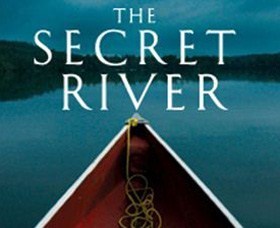
Sydney Theatre Company poster
Earlier this year as part of the Sydney Festival the Sydney Theatre Company presented a stage version of Kate Grenville’s A Secret River, adapted by Andrew Bovell and directed by Neil Armfield. It was extremely well received – by critics and friends who saw it – and I am really sorry not to have been there to see it. I am now looking for a copy of the playscript which after a cursory Google I haven’t been able to find. If anyone happens to be reading this and can either tell me if such a thing is available, anywhere, and better still if you saw the production, I’d love to hear from you. Thanks.

The set – a giant gum tree (abc.net.au)
(And yes it is the same river.)


May 29, 2013
An interview with Rebecca Swift
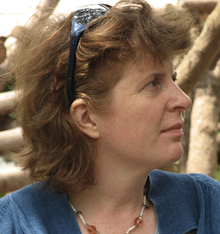
Rebecca Swift
Rebecca Swift founded The Literary Consultancy – www.literaryconsultancy.co.uk – the country’s (and perhaps the world’s) first and leading manuscript assessment service, in 1996. She has seen a few changes in the intervening years but nothing quite like the explosion that is self publishing. I met up with Rebecca earlier this week.
Patsy: What differences has self publishing made to the book world in your experience?
Rebecca: It is a radical revolution. Some writers can make it work better than others. A good enough writer who is excellent at self promotion stands a better chance of success than the good writer who lacks marketing skills. It helps to be technically savvy of course. Recently I have seen two very different kinds of writer who have come through TLC’s assessment service turn to self-publishing out of frustration at not being taken on by agents, despite their work being of a good standard. The commercial novelist Tina Seskis is doing well on Amazon with her novel One Step Too Far. Tina had a marketing background and also spent money on marketing through Netgalley [netgalley.com] which she thinks is helpful and helped her get online reviews. Sales are unpredictable however; a charming and informative self published memoir on project management called Project Management: All You Need is Love by Pete Smith is not selling as well on Amazon as we expected which may be because the author isn’t a marketer, but also of course because the book isn’t so obviously commercial.
Self publishing is trumpeted as ‘free’ but there are costs involved – for editing, copy editing and/or proof reading and cover design – and the more successful self publishers also spend money on marketing. It’s no good just uploading your book onto Amazon and waiting for something to happen. Amazon helps people who help themselves with their own marketing strategies. There are companies springing up now who will market your book for a percentage of the sales, such as epubli [epubli.co.uk] and Acorn Publishing [acornselfpublishing.com]. The rules that apply to traditional publishing apply equally to self publishing, if not more so. While it is possible to self publish a book that covers different genres Amazon itself is still quite conservative, and as in traditional publishing ‘genre’ books – crime and commercial fiction in particular – are still the best sellers. Along with fan fiction.
P: What is fan fiction?
R: It’s where a writer takes famous characters from literature – such as Mr Darcy – and weaves a fictional tale around them. Amazon is planning on publishing and even commissioning fan fiction. We have a wonderful editor who works for us, Sally O J, who is going to be talking at our conference about this rising phenomenon.
P: Without the backing of a traditional publisher to give a book credibility it is difficult for the reader to separate the quality self published books from the rest. Is there a way that an organisation with the reputation such as TLC’s can act as a kind of curator, or ‘gatekeeper’ (for lack of another word)?
R: Quite possibly, and we are looking for a way to make this work. I’d say watch this space – as we see a great deal of talent come through our books and we want to help those who go on to self-publish get discovered.
We have lists of recommended editors and copy editors, but we still feel there is a moral responsibility to ensure that people know exactly what they are buying and why, whereas some companies are now just selling expensive authors’ services, as they are called, to anybody. There are companies on the rise however who are looking to offer real value to writers who self-publish, but writers should be very careful about their expectations and what they are buying from whom.
P: Do you have any specific advice for a writer who is contemplating self publishing?
R: Do your research well before parting with money. The Alliance of Independent Authors (Alli) I understand helps writers keep in touch about what works and what doesn’t in self-publishing. And of course, get a proper editorial assessment to help you get your work as good as it can be, and to understand its weaknesses as well as its strengths. Our conference should be genuinely useful to people wanting to find out more.
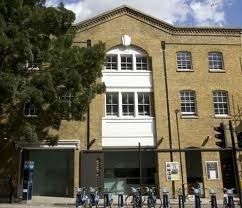
The Free Word Centre
TLC’s conference Writing in a Digital Age takes place at the Free Word Centre at 60 Farringdon Road on June 7 and 8. For more information and booking details visit
www.literaryconsultancy.co.uk/events/info /


May 22, 2013
The author and the playwright
I began my writing life as a scriptwriter. There are advantages to starting out this way. The scriptwriter creates his or her characters entirely through dialogue and, unless he wants to seriously annoy his actors (or he is Bernard Shaw), he will avoid describing his characters’ characteristics, physical or otherwise, or how a line should be delivered, in the stage directions.
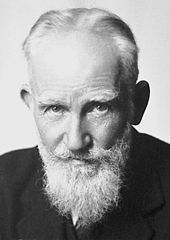
Bernard Shaw, not known for his economy, though a remarkable playwright and man
What’s more the scriptwriter understands economy: she/he knows that every word in a play has to earn its keep so he/she is less likely to over-explain the characters or their background, or tell the audience or viewer what to think (unless he is Bernard Shaw). And since drama is a collaborative affair the script the writer delivers may well undergo such radical change through the actors’ (and others’) interpretation that the finished product is almost unrecognisable. Moreover again, as the continuing legacy of our ‘classic’ playwrights such as Shakespeare, Ibsen, Chekhov etc have proven, there is more than one way to pay Hamlet, or Nora, or Uncle Vanya.
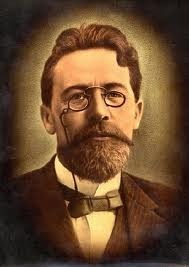
Anton Chekov, master of mockery
The author on the other hand has complete control over his work, if not how it is interpreted. When I turned to writing books rather than scripts, which I did only comparatively recently, I came up against the challenge of Description. In a play all you have to say to describe your setting is something like ‘A bedsitting room: two doors, one L one R, sofa DR, two chairs, table C, window UC, and a general feeling of chaos’; but in books the writer is expected to paint pictures in words, eloquently and evocatively – a problem I found irksome not only because I’m not very adept at writing description but because I kind of expected the reader to supply their own pictures from their imagination, as they would for instance in a radio play; which turned out to be not totally satisfactory, or so I was told.
But the thing I found most difficult of all - other than the old old problems of ‘he said, she said’ etc – was the rhythm of a dialogue scene. In a script if you want a pause you can simply write ‘pause’, or perhaps ‘silence’, or even at a pinch ‘beat’, or – if you’re Harold Pinter – ‘…’; all of which mean different things.
In a book you’ve got to find another way. You can say ‘there is a pause’, or even ‘there is a silence’, and ‘he/she doesn’t reply’, but you can’t keep doing that all the time. Early on in my book there’s a scene where the erudite, wealthy and urbane George Matcham (Nelson’s brother in law) pays a visit to his cousin Mary Pitt to put to her the proposal that she emigrate to New South Wales. In order to indicate a lull in the conversation, after I’d exhausted all the ‘pauses’ and ‘silences’ I had Mary staring into the middle distance, or George crossing his legs, or tugging at his waistcoat, or leaning forward on his chair. When I read the scene back I realised he’d crossed his legs so often he’d turned – as a friend of mine (not a writer) eloquently described – into a pretzel. And he’d lent forward so much he’d have tumbled right off the chair. I think that one scene took me as long to write as an entire full-length play.
There’s no question which is the easier thing to write. There are some authors who can churn them out in a few weeks, but generally speaking you’re talking of months, or even years, to produce a book; whereas some playwrights – notably Noel Coward and Alan Ayckbourn – allegedly have written plays over a weekend.
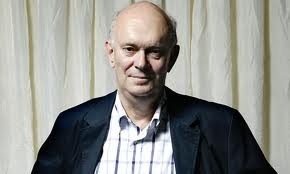
Alan Ayckbourn
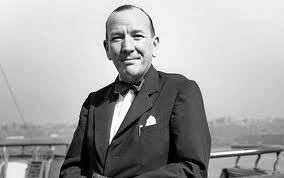
Noel Coward
So why is it that there while there seems to be no shortage of really readable new books being published that there are so few really watchable new plays?


May 20, 2013
Self publishing workshops
It was what I really wanted when I was struggling to convert my book into e-form a year ago. So in preparation for my inaugural hands-on self publishing workshops (for e-form and print), I have updated my Self publishing ebooks page.
Written instructions are all very well, and there is plenty of information on the web about the technicalities of converting, preparing and submitting mss in e-form. But how much time, frustration and hair I’d have saved if I’d had someone right there to guide me.
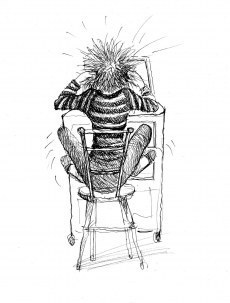
Sketch by Anna de Polnay
So if you happen to be in East Sussex towards the end of June then come along to St Mary’s Church Hall and take part in one – or both – of my workshops. They take place on Tuesday 25 June (for ebooks) and Thursday 27 June (for print), from 10.30 – 4.30pm, at St Mary’s Church Hall, Ticehurst, East Sussex. The cost is £25 per workshop or £40 for two. If you are interested, or want more information, please email me at patsytrench@gmail.com.
If you can’t make it to Ticehurst but are interested in workshops in London, please email me.


April 11, 2013
Bookshops, reviews, and goodbye
(Posted from Sydney Airport)
Once again it’s farewell to TimTams, Vitawheat, sunshine, technicolour skies, translucent seas, whacky birds, weird weather and all the other things that make this beautiful country what it is.

What keeps the hungry writer going
I will miss all of it.
What I won’t miss however is trying to flog my books around the independent bookshops in Sydney – of which, I thought, there were a greater number than have survived in London. After days of footslogging around the suburbs I have received only one positive response; for which thank you to Gleebooks, who not only agreed to take copies of my book but did so with great efficiency and courtesy, all of which did wonders to restore a bit of this writer’s self-respect.
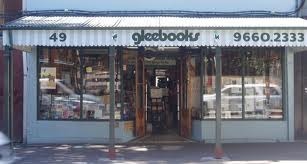 It takes some guts to write a book but boy that’s nothing compared with what it takes to sell it. Which brings me to another thorny topic:
It takes some guts to write a book but boy that’s nothing compared with what it takes to sell it. Which brings me to another thorny topic:
Reviews
I’ve had some great responses on Amazon from people who’ve read my book, not all of whom are friends or family. But when it comes to getting other organisations or publications to review it I’ve come up against the bane of writers everywhere: the pigeonhole.
The Society of Australian Genealogists (aka SAG) were confused by Worst Country because it wasn’t strictly speaking straightforward family history. The Historical Novel Society thought it a great read but couldn’t circulate the review because the book is not strictly speaking a novel.
So I guess it’s time we self-publishers formed our own genre-free reviewing society. Or perhaps it’s already been done?
So a sad goodbye to Sydney (leaving never get easier) and hello shortly to LA.
See you all next time.
March 30, 2013
Marketing strategies
A while ago I invited comments on the weirdest book marketing strategies, and over the weekend I’ve come upon two that might do the job pretty well, though at some cost to the marketer.

Tom Hanks (looking very like Simon Callow)
The first involves homicide: if you’ve seen the film of Cloud Atlas you’ll remember the book launch scene where a weird Irish writer played by Tom Hanks chucks an obstreperous critic off the roof of the building they’re in, and the ensuing publicity sends sales of his book through the roof (pun intended), to the delight of his publisher, Jim Broadbent.
 The second I saw just now walking along the street in Coogee in Sydney: it’s the T-shirt. It was adorning the body of a young man and said I lost you at hello which I vaguely thought was the title of a book (and a rather unlikely choice for this particular wearer). Further investigation however shows it to be the name of an album by a band called, I think, The Bushmen. (The book is called You had me at hello.)
The second I saw just now walking along the street in Coogee in Sydney: it’s the T-shirt. It was adorning the body of a young man and said I lost you at hello which I vaguely thought was the title of a book (and a rather unlikely choice for this particular wearer). Further investigation however shows it to be the name of an album by a band called, I think, The Bushmen. (The book is called You had me at hello.)
Both options have drawbacks: I’m not strong enough to chuck anyone off a roof however much they disliked my book. And I’m not sure if wandering the streets of Sydney wearing a T-shirt proclaiming this is The worst country in the world would be very good for my health (though it might work in London).
But there: I’ve given publicity to a film, a book and an album, even if none of them have anything to do with me. (Though I did enjoy Cloud Atlas the film and am now enjoying the book, after a fashion.)


March 29, 2013
Peter Norman again
I first blogged about Peter Norman months ago during the London Olympics, and now that I’m actually in Sydney I decided to make a pilgrimage to Newtown to see if the mural painted to commemorate the athlete’s selfless act of bravery during the 1968 Olympics was still there.
Not only did I find the mural, I found the owner of the house the mural is painted on, a friendly guy named Silvio. It (the mural) was apparently the brainchild of a young man named Don who fetched up at Silvio’s house one day in 2000 asking if he could use his wall for the mural as it was right by the railway taking spectators to the Olympic stadium at Homebush. Silvio advised him to come back with scaffolding and copyright permission, which he did; and while the house is no longer threatened with demolition the soundproof wall next to the railway does a very good job of obscuring Don’s tribute from train travellers; which is a shame since it is tucked away down a rather obscure cul de sac and you wouldn’t know it was there unless you made an effort to seek it out.
So all power to Don for his enterprise, and to Silvio for his support.

Silvio and his decorated wall



